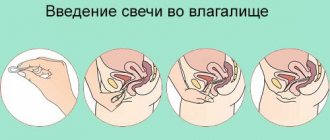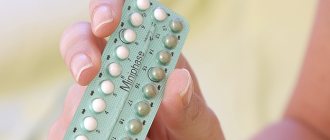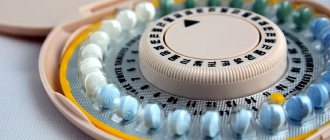Many girls are concerned about the question of how oral (hormonal) contraceptives affect the menstrual cycle and the abundance of menstruation itself. Let's talk about this in more detail.
IMPORTANT! Before starting to take contraceptives, you should visit your doctor. Self-prescribing drugs can harm the female reproductive system!
Oral contraceptives and periods
It is no secret that taking contraceptive pills (COCs) can affect the regularity of the menstrual cycle and the nature of the periods themselves. This happens because the drugs contain different doses of the estrogen hormone, which is responsible for the formation of the first phase of the menstrual cycle.
During this period, a follicle-stimulating substance is released, which is responsible for the active activity of one of the ovaries (a small cavity with an egg inside appears on the surface of the organ).
In the middle of the cycle, the hormone estrogen is replaced by luteinizing hormone, which ensures the release of the egg from the follicle. This is ovulation. And it is during this period that it is so easy to get pregnant.
Operating principle OK
- Increases estrogen levels. In this regard, the follicle-stimulating substance ceases to be produced. Ovulation does not occur. The risk of getting pregnant goes away.
- Affect the quality of cervical mucus. During the cycle, the nature of vaginal discharge changes. Before ovulation, the volume of cervical mucus increases. It becomes viscous and transparent, which facilitates the favorable passage of sperm. Contraceptive drugs negatively affect the secretory glands of the cervical canal, reducing the secretion of mucus. Cervical secretions become too viscous. Once in such an environment, male reproductive cells cannot pass through it and die.
Upon admission
COCs contain 21 tablets per package. After completing the packaging, you need to take a week break. Ideally, your period should begin during the break. However, their onset does not always occur in a timely manner, especially in the first months of use - menstruation may begin earlier or later.
The body needs time to get used to the drug. Sometimes the process of getting used to the body and restoring the cycle takes up to six months.
You should know that when you take birth control pills, the nature of your periods also changes - menstrual-like discharge may appear, periods may become heavier or weaker, longer or shorter, etc.
IMPORTANT! If your period does not start even on the sixth day after finishing the package, you should take a pregnancy test. If it is negative, then regardless of whether menstruation began immediately after taking the 21st tablet or not, you should start taking the next package exactly 7 days after the break. This will allow you to get a cycle of 28 days.
What changes may occur during the formation of a cycle:
- change or cancellation of PMS (due to the fact that when taking OCs the growth of progesterone stops)
- failure of the duration of menstruation (in the first months 2-3 days, subsequently 3-5 days)
- cycle failure (recovered in 1-6 months)
- decrease or increase in discharge volume
- change in the nature of discharge (taking OCs does not always cause thinning of menstrual discharge, sometimes periods become thick and scanty. This occurs due to an increase in the level of platelets and leukocytes)
- absence of menstruation in the first months of taking the drug
Many women note a decrease in the volume of discharge and a change in premenstrual symptoms.
IMPORTANT! All changes occur in the first 2-3 cycles of taking the drug. If, after this period, radical deviations from the norm continue, then you need to contact a specialist. Perhaps a more suitable drug will be selected for you.
After cancellation
After stopping taking hormonal medications, many women experience irregularities in their menstrual cycle. This is normal, because... During the first few months, your natural cycle is restored. If the problem does not go away for a long time, then you need to contact a specialist. The reason for the jumps lies in the failure of the activity of one or another hormone. Once identified, you will be prescribed treatment.
If after stopping hormonal contraceptives there are no periods for a long time, then you should consult a doctor. The gynecologist will examine you, firstly, for pregnancy, and secondly, to identify pathologies and side effects.
If you do not have periods after taking OK, you need to do an ultrasound of the pelvic organs, donate blood for hormones (required LH and FSH), and be examined by a doctor.
Mini-pills and menstruation
When taking the mini-pill, there is no need to take a break between packs! We accept without interruption: as soon as one package is finished, we immediately open another.
Read more about the action of the mini-pill
Time versus menstrual cycle
There is no exact answer to how long you can take contraceptives without harm to the body. According to gynecologists, for 6 months, after taking a break of 2 months, pharmacists advise not to interrupt taking birth control pills at all until the woman plans to have a child, and women themselves are guided like this - take pills for 3 months and rest for 1 month.
According to the results and surveys of American scientists from the Institute of Gynecology, the best option is still an experiment by the women themselves (3 through 1). The results of the study after the surveys were published in the journal Sexual Life. The fact is that a month of recovery is quite enough for the female body, and 3 months of taking it will not affect menstruation in any way and there will be no delay. But this increases the likelihood of conception, but the menstrual cycle will be fine.
Taking birth control for more than 6 months often leads to a decrease in menstrual bleeding, even to its complete disappearance. It takes more than 3 months for the body to function normally and the functions of the egg to be restored. Whether it is worth taking medications for a long time or not is up to you to decide.
Emergency contraception and periods
After taking EC (even once), the menstrual cycle will be unstable for some time. This happens because when you take an emergency pill, a huge amount of hormones enter your body.
Usually, after taking EC, periods begin earlier than expected (by about 1-2 weeks), if the emergency contraceptive drug was taken in the first half of the menstrual cycle.
It is possible that menstruation will begin 3-7 days later than expected. But if the delay is more than seven days (even after taking Escapel or Postinor), then it is necessary to undergo examination by a gynecologist for pregnancy.
You should know! For several months, and sometimes up to six months after using EC, minor cycle disruptions may occur. Also, taking EC can affect not only the frequency of the cycle, but also the characteristics of the menstruation itself. Discharge can become scanty or abundant, short or prolonged, etc.
Menopause and pills
Older women also need protection from unwanted pregnancy, and many say NO to barrier methods.
There remains another option - contraception. If you have been taking medications for a very long time (NOTE! Women of reproductive age do this, mistakenly believing that the body has served its purpose, the child has been born, now menstruation can be induced artificially. This is not so!), and after stopping, menstruation never came, then the woman raises the alarm.
It often turns out that the body has begun to enter menopause and the menstrual cycle simply comes to naught, which is absolutely natural. But you should still consult a doctor to rule out possible sexually transmitted infections and diseases.
And, by the way, hormonal pills do not protect against STDs, so the development of infectious diseases is quite possible.
Sometimes, after stopping taking the pills, there may also be a delay. No, you don't need to worry. This is explained by the fact that the body adapts to a new way of existence. If earlier menstruation “came when called,” that is, artificially, now the egg itself must perform the natural functions of the body.
Monophasic contraceptives for delaying menstruation
- Oral contraceptives
If a woman is already taking COCs, then after finishing one pack, she should immediately, without interruption, start another. If a woman does not take monophasic COCs, then she can (for the sake of delaying menstruation) start taking them on any day of the cycle, but no later than three days before the expected start of menstruation. Your period should start 2-3 days after you finish taking it. In this case, you cannot count on the effect of contraception.
IMPORTANT! Taking COCs without interruption is harmful to women's health!
- Progestins (gestagens)
They are usually prescribed to lengthen the menstrual cycle. Start taking 14 days before the start of menstruation, but no later than 5 days. The course ends on the day when menstruation usually ends. Your next period should start in 1-3 days. Examples of drugs:
- Orgametril
- Exluton (Orgametril)
- Pregnin
- Primolut-Nor
ATTENTION! Before making a decision to delay menstruation, you need to consult a gynecologist-endocrinologist. It is necessary to find out whether there are any problems with blood clotting and gynecological diseases; Is everything okay with the blood vessels, heart and liver?
ATTENTION! Hemostatic drugs to delay menstruation can cause irreparable harm to health! Their use is strictly prohibited!
Pregnancy and hormonal pills
Delayed menstruation is more often caused by pregnancy, even if the woman is taking contraceptives. The reason for this is not the conscientiousness of the producers, but the punctuality and responsibility of the woman.
Even if there is a reminder on 3 phones at once, a person may forget an important detail that he should do right now, the same situation can happen to a woman: she forgot to take a pill for 1 day, the effect is reduced by 10%, and this is already a risk. You never know there will be days like this. Yes, pharmacists advise taking the pill within 24 hours, even if time has passed. But you will remain unprotected from unwanted pregnancy and, as a result, your period will be delayed.
Another category can be included here - bad habits. Drinking alcohol while taking hormonal pills reduces their effectiveness and, moreover, the body loses its performance. Restoration requires endless resources, and the conceived child also requires its own. As a result, the forces for recovery leave the reserve that was intended for the baby, and the result is deviations in the development of the fetus. Well, a delay in menstruation is a given.
Possible complications when taking OCs
- hormonal imbalance
- breakthrough bleeding (heavy, heavy periods while taking OCs, bright red discharge with no mucus). If breakthrough bleeding occurs, call an ambulance or consult a doctor immediately.
- allergic reactions
- cessation of ovarian function (possible only after stopping taking contraceptives)
- change in blood fluid thickness
- dyspeptic symptoms
- change in the quality of vascular fiber
- nausea, vomiting, diarrhea (should disappear after 2-3 cycles of administration)
- pregnancy
IMPORTANT! Uncontrolled use of drugs can cause complications.
Side effects
Since it was previously mentioned about the duration of use and harm to the body, we need to take a closer look at the side effects. We have familiarized ourselves with the deadline for acceptance, let’s move on to other points:
- Obesity. Although modern drugs do not add excess weight, they do affect appetite. As a result, extra pounds appear, thanks to which even your personal life comes down to the word “No,” let alone health. And for a woman, even minor fluctuations in weight can be decisive in the disappearance of menstruation.
- Hormonal imbalance. Often when taking birth control, a woman asks the question: “Is it effective?” Constant tension during sexual intercourse and regular philosophizing on this topic can lead to a nervous breakdown and hormonal imbalance. No, you shouldn’t be skeptical about this - this is the main reason for the delay.
- Incorrect prescription of the drug. Especially important for a young body. Even microdosed drugs can have a strong effect on teenage girls, and the wrong drug will lead to the disappearance of menstruation.
That is why it is not recommended to select contraceptive drugs on your own until all tests have been completed and the woman has been examined by a gynecologist.
What happens after the appointment ends?
When a woman stops taking contraceptives, her period does not come immediately. Although hormones that inhibit the development of the egg do not enter the body, the process of its maturation remains slow for some time.
Menstruation can occur in a week, a month, or even six months. This depends on a number of factors:
- Woman's age.
- Period of taking the drug.
- Type of contraceptives.
- The woman's health status.
The younger the fair sex, the faster her period will begin. In women over 40 years of age, menstruation may occur within six months after taking the last contraceptive pill.
Hormonal oral contraceptives sometimes affect the timing of menstruation. Its period may become longer or shorter than before taking the drugs.
But hormonal contraceptives do not affect the frequency of menstruation. If they were regular before you started taking the pills, they will remain that way. If there was a disturbance in the menstrual cycle, after stopping pregnancy protection in this way, the cycle will remain irregular.
Return to contents
Why don't I get my period after taking birth control?
- Temporary infertility
- What happens after the appointment ends?
- Excessive delay
- Stopping taking contraceptives
One day there comes a time when a woman decides to stop taking contraceptives. But then she’s faced with the fact that she doesn’t get her period after taking birth control pills. Should I be worried in this case?
Temporary infertility
To prevent unwanted pregnancy, women use different methods: mechanical, chemical, hormonal.
The most reliable of them are hormonal oral contraceptives. The mechanism of their action is to artificially prevent the maturation of the egg. Cervical mucus thickens in the fallopian tubes, and sperm are practically unable to penetrate the uterus.
During the entire period of taking contraceptives, the probability of becoming pregnant is no more than 3%. A woman's reproductive organs become almost sterile.
Some representatives of the fair sex, having heard enough horror stories about the harmful effects of hormonal drugs on the body, prefer to protect themselves from unwanted pregnancy by any other means.
But most doctors are in favor of taking hormonal contraceptives. They can sometimes cure infertility and even some gynecological diseases.
The first contraceptive pill should be taken on the first day of your period. Gradually the discharge will disappear. And then menstruation will stop altogether.
Return to contents
Formation of a cycle during contraception
Menstruation does not begin immediately while taking birth control pills and may have various deviations from the norm. When using hormonal medications, menstruation should begin within three weeks. But the formation of a cycle does not occur immediately. In the first few months, the appearance of discharge may occur before the end of the package. Some patients do not start their periods after the first package. For this reason, a woman should be aware of what problems may arise in the first three cycles of oral contraception. The following possible problems are being considered:
- reduction in the volume of secretions;
- failure of the duration of menstruation;
- absence of menstruation;
- change in premenstrual symptoms.
Most women note a decrease in the volume of discharge. Menstruation becomes scanty, mucous impurities disappear. This change occurs due to a decrease in the level of follicle-stimulating hormone. It is responsible not only for the formation of the follicle, but also for the growth of the endometrial layer of the uterus. This tissue serves as a kind of bed for the fertilized egg. For a normal pregnancy, the tissue must have a thickness of at least 11 mm. If conception does not occur, during menstruation, the remnants of the endometrium are removed from the uterus.
The number of days of the menstrual cycle varies from woman to woman
When the level of follicle-stimulating hormone decreases, the endometrium does not grow to the desired size. Its thickness is 3–5 mm. With this thickness, the volume of discharge is significantly reduced.
The duration of menstruation varies from woman to woman. The discharge can last from three to seven days. When taking birth control pills, the duration of menstruation also decreases. This is due to a decrease in the volume of secretions. Menstruation in the first cycles can last 2-3 days. After the body gets used to the tablets, the duration can be 3–5 days.
In some cases, the discharge disappears during the first cycles. Don't be afraid of this. The body needs some time to develop a habit of the drug. If there is sufficient estrogen accumulation, menstruation will return on its own.
What else affects the cycle
In rare cases, periods do not begin immediately after stopping the pills. In a normal cycle, discharge appears the next day after the end of the package. At first, menstruation can begin on any day of the seven-day break. But it is worth knowing that if menstruation began on the last day of the break, taking the pills begins strictly according to the schedule - on the eighth day. Gradually, the duration of the cycle normalizes. The cycle length will be four weeks.
A change in premenstrual symptoms is also noted. A few days before the expected period, women experience a variety of symptoms. There is an increase in breast volume, nagging pain in the lower abdomen, changes in mood, and a slight increase in body weight. These symptoms occur due to progesterone. The hormone affects the activity of the vascular, nervous and lymphatic systems. When taking oral contraceptives, the increase in progesterone stops. The hormone is produced in the corpus luteum, which forms at the site of the burst follicle. Due to the lack of ovulation, progesterone cannot rise. For this reason, premenstrual syndrome disappears. This is not something to be afraid of. The body rests from the activity of progesterone.
The listed problems arise in the first 2–3 cycles of therapy. Normally, side effects should disappear after getting used to the active substance. If these disturbances do not disappear, you need to inform your gynecologist about this. The doctor must change the drug or method of protection against unwanted pregnancy.
Excessive delay
Some doctors believe that it is normal for menstruation to begin 3 months after stopping taking contraceptives. If this period is longer, you should consult a specialist. Possible reasons for non-occurrence of menstruation for more than 3-6 months:
- Pregnancy.
- Amenorrhea.
- HIV infection.
- Venereal diseases.
- Infectious diseases.
- Ovarian dysfunction.
- Disorders of the body's endocrine system.
If there is reason to believe that a woman is pregnant, you should undergo a rapid test before going to the gynecologist. Two colored stripes will confirm your guess.










